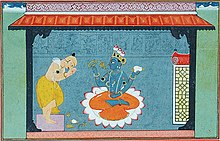Om Namo Bhagavate Vāsudevāya
| Part of a series on |
| Vaishnavism |
|---|
 |
Om Namo Bhagavate Vasudevaya (ⓘ) (in devanagari: ॐ नमो भगवते वासुदेवाय) is one of the most popular Hindu Mantras, and the most important mantra in Vaishnavism. It is called the Dwadasakshari Mantra or simply Dwadasakshari, meaning the "Twelve-Syllable" mantra dedicated to Vishnu and Lord Krishna both.[1][2] It has two traditions—Tantric and Puranic. In the Tantric Tradition, the Rishi of the Mantra is Prajapati; in the Puranic Tradition the Rishi is Narada. Both, however, say it is the Supreme Vishnu Mantra.
Sharada Tilak Tantram says:
"Dvadasharno Mahamantrah Pradhano Vaishnavagame"— The Twelve Lettered Mantra Is The Chief Among Vaishnava Mantras.
Similarly, this is the ultimate mantra in Shrimad Bhagavatam. This twelve syllable mantra[3] is known as a Mukti (Liberation) mantra and a spiritual formula for attaining freedom.[4] The mantra can also be found in the Vishnu Purana.
Meaning
Om Namo Bhagavate Vasudevaya means "Om, I bow to Lord Vasudeva or Lord Vasudev or Lord Vishnu".[5] According to Dada Bhagwan, a Vasudeva is a being who has evolved from an ordinary human being (Nara) into God (Narayan).[6]

| Term | Devanagari | Listen | Meaning |
|---|---|---|---|
| Om | ⓘ | Refers to the Supreme Infinite Spirit or Person. Om represents the Shabda Brahman. | |
| Namo | ⓘ | Salutation, worship, a common spoken valediction or Salutation originating from the Indian Subcontinent. 'Namo' नमो is the Sandhi form of 'Namas' नमस्, neuter nominative singular. | |
| Bhagavate | ⓘ | 1. God in Sanskrit, someone who is considered God (Or Equally Powerful, Merciful). 'Bhagavate' भगवते Is The Dative Of 'Bhagavat' भगवत्. 2. Bhagavate is one who is becoming divine.[7] | |
| Vasudevaya | ⓘ | Vasu means "Life In All Beings" Devaya means "God". This means God (Life/Light) Who Lives Of All Beings. Other meaning for Krishna is also known as Vasudeva (Krishna), because He was the son of Vasudeva. In the Bhagavad-Gita, Arjuna called Krishna by the name Vaasudeva multiple times. 'Vasudevaya' वासुदेवाय Is The Dative Of 'Vasudeva' वासुदेव. |
Importance
Om Namo Bhagavate Vasudevaya means "Prostration To Vasudeva" who is variously understood as Krishna an incarnation of Vishnu."[8] Krishna Himself asked His devotees to completely surrender to Him:
सर्वधर्मान्परित्यज्य मामेकं शरणं व्रज ।
अहं त्वां सर्वपापेभ्यो मोक्षयिष्यामि मा शुचः ॥१८- ६६॥
Translation Abandon All Varieties Of Duties Or Desires And Just Surrender Unto Me. I Shall Deliver You From All Sinful Reaction. Do Not Fear. [Gita 18/66]
Popular Culture
- Dhruva used this as his mantra in his penance. Dhruva was initiated by Narada into chanting.[9]
- Swami Vivekananda used this phrase multiple times in his lectures and letters.[10][11]
- Swami Sivananda suggested to repeat mantras like Om or "Om Namo Bhagavate Vasudevaya".[12]
- Vedanta philosopher Dayananda Saraswati wrote a book named "Om Namo Bhagavate Vasudevaya".[13]
- Willow Smith and Jahnavi Harrison put this mantra into their song Gajendra from their collaborative album RISE
See also
References
- ^ Prabhakar Balvant Machwe (1983). Bhāratīya Saṃskr̥ti, Volume 1. Bhāratīya Saṃskr̥ti Saṃsada. p. 212.
- ^ Edwin F. Bryant. Krishna: A Sourcebook. Oxford University Press. p. 354.
- ^ Alexander Studholme (2002). The Origins of Oṃ Maṇipadme Hūṃ: A Study of the Kāraṇḍavyūha Sūtra. SUNY Press. p. 177. ISBN 978-0-7914-5389-6.
- ^ "Om Namo Bhagavate Vasudevaya". Retrieved 14 April 2012.
- ^ J. Donald Walters (1 March 2002). The Art and Science of Raja Yoga: Fourteen Steps to Higher Awareness : Based on the Teachings of Paramhansa Yogananda. Crystal Clarity Publishers. pp. 251–. ISBN 978-1-56589-166-1. Retrieved 24 June 2012.
- ^ "Who Is a Vasudeva?".
- ^ "Chanting Om Namo Bhagavate Vasudevaya". Retrieved 14 April 2012.
- ^ Swami Krishnananda. "The Significance of Mantra-Japa Sadhana". swami-krishnananda.org. Retrieved 14 April 2012.
- ^ "Dhruva". Vaniquotes. Retrieved 14 April 2012.
- ^ "Swami Vivekananda Letters". Vedanta network Boston. Retrieved 14 April 2012.
- ^ "Swami Vivekananda letter the 15th February [1893]". Ramakrishna Vivekananda Info. Retrieved 14 April 2012.
- ^ "20 Instructions by Swami Sivanananda". Writespirit. Retrieved 14 April 2012.
- ^ "Om Namo Bhagavate Vasudevaya by Swami Dayananda Saraswati". vedicbooks.net/. Retrieved 4 May 2012.

